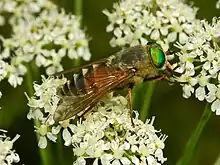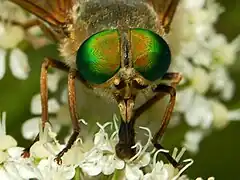Philipomyia aprica
Philipomyia aprica is a species of horse fly of the family Tabanidae, subfamily Tabaninae.[3][4][5]
| Philipomyia aprica | |
|---|---|
.jpg.webp) | |
 | |
| Male (top) and female (bottom) | |
| Scientific classification | |
| Domain: | Eukaryota |
| Kingdom: | Animalia |
| Phylum: | Arthropoda |
| Class: | Insecta |
| Order: | Diptera |
| Family: | Tabanidae |
| Subfamily: | Tabaninae |
| Tribe: | Diachlorini |
| Genus: | Philipomyia |
| Species: | P. aprica |
| Binomial name | |
| Philipomyia aprica | |
| Synonyms | |
Distribution
This horse fly is present in most of Europe and in the Near East (Caucasia, Turkey, Iran) .[6][7]
Description

The adult females grow up to 18 millimetres (0.71 in) long. Their large compound eyes are bright green, without hairs and ocular bands. The terminal of antennae is brownish-black. The thorax is dark-brown and quite hairy. The abdomen has clearer bands at the end of each black tergite. Wings and legs are yellowish-brown. Halteres are brownish-yellow.[8][9]
Biology
These common horse flies can be encountered in Summer in high mountain at an altitude of over 2000 meters during the daylight hours, when they mainly feed on nectar of flowers (especially of Apiaceae species). Females attack mainly horses and cattle.
References
- Meigen, J.W. (1820). Systematische Beschreibung der bekannten europäische n zweiflugeligen Insekten. Aachen: Zweiter Theil. Forstmann. pp. xxxvi + 363. Retrieved 8 July 2022.
- Loew, H. (1858). "Zur Kenntniss der europäische n Tabanus-Arten" (PDF). Verhandlungen der Zoologisch-Botanischen Gesellschaft in Wien. 8 (Abhandl.): 573–612. Retrieved 12 October 2022.
- Biolib
- Moucha, J. (1976). "Horse-flies (Diptera: Tabanidae) of the World. Synoptic Catalogue" (PDF). Acta Entomologica Musei Nationalis Pragae Supplements. 7: 1–320. Retrieved 11 September 2022.
- Chvála, Milan; Lyneborg, Leif; Moucha, Josef (1972). The Horse Flies of Europe (Diptera, Tabanidae). Copenhagen: Entomological Society of Copenhagen. pp. 598pp, 164figs. ISBN 978-09-00-84857-5.
- Fauna europaea
- Catalogue of life
- Stjepan Krčmar, Davorka Hackenberger, Branimir K. Hackenberger Key to the horse flies fauna of Croatia (Diptera, Tabanidae) Periodicum Biologorum 113:5-33
- George C. Steyskal, G. Ya BejBienko - Keys to The Insects of The European Part of The USSR - Oxonian Press, 1988